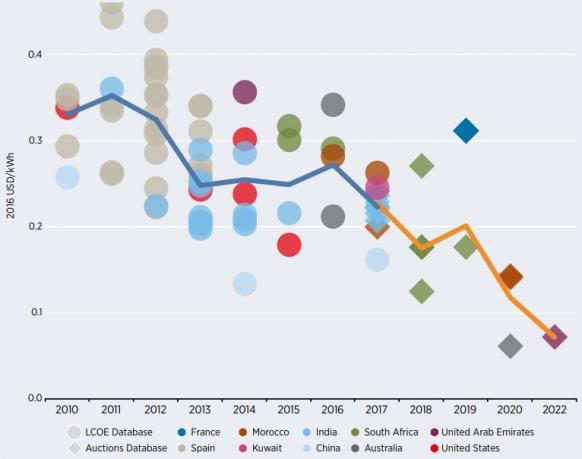Morocco hybrid CSP-PV project seen as 'game changer' for costs
Technology coupling gains and a favorable development framework could see prices for Morocco’s pioneering Noor Midelt hybrid projects trend towards the lowest global CSP tariffs, experts told the CSP Madrid 2018 conference.

Related Articles
Now entering the final stages of tendering, Morocco's Noor Midelt hybrid CSP-PV project is expected to set a benchmark price for combined CSP and PV at scale.
Activity in hybrid CSP-PV projects is growing as operators seek lower cost solar power that can be dispatched across peak demand periods.
While CSP costs continue to fall, hybrid CSP-PV plant developers forecast greater cost reductions from combining low-cost PV with CSP storage capability.
Morocco has tendered for two hybrid solar plants at Noor Midelt, which will each have a gross CSP capacity of between 150 MW and 190 MW. The projects will include a minimum five hours storage capacity and PV capacity is to be determined by the developer.
Five international CSP consortia prequalified for the tender, including groups led by ACWA Power, France's EDF EN, Engie (formerly GDF Suez), Germany's Innogy and Japan's JGC.
Morocco's supportive development framework has already been a key driver of cost reductions and innovations on its Noor I (($189/MWh) and Noor II ($140/MWh) parabolic trough projects, and its Noor III ($150/MWh) tower plant, all developed by ACWA Power.
The Noor Midelt plants could be a "game changer for the solar industry," Yasmina Benmessaoud, Business Intelligence Manager at the Moroccan Agency for Sustainable Energy (Masen), told the CSP Madrid 2018 conference on November 13.
The latest CSP tariff prices in Dubai and Australia have shown that project costs have fallen to new levels, Benmessaoud said.
Dubai signed a record-low tariff price of $73/MWh for ACWA Power's 700 MW DEWA CSP project with up to 15 hours storage, which was recently amended to incorporate a further 250 MW of PV. In Australia, SolarReserve was awarded a 20-year power offtake agreement at AU$78/MWh (then $61/MWh) for its 150 MW Aurora CSP plant with eight hours storage.
"We see a global trend towards $.06-$.10 per kilowatt-hour ($60-$100/MWh)],” Benmessaoud told attendees.
“We hope we will see in the coming months the outcome of Midelt [phase] 1 going toward this trend,” she said.
CSP levelized cost of energy, auction price trends
(Click image to enlarge)
Source: International Renewable Energy Agency (Irena), January 2018.
CSP support
Morocco's support for CSP with storage is driven by renewable energy targets and a direct market need to supply evening peak demand. Morocco has pledged to generate at least 52% of electricity from renewable sources by 2030.
The Noor Midelt projects will be developed through an independent power producer (IPP) scheme in which the successful consortium designs, finances, builds and operates the plants and sells the electricity to Masen under a 25-year PPA.
The Noor Midelt site benefits from strong Direct Normal Irradiance (DNI) of approximately 2,360 kWh per square-meter per year.
To minimize development costs, Morocco has implemented a "plug and play" approach to plant procurement, where many development and financial risks are assumed by Masen.
Masen acts as offtaker, selling on the power to the Moroccan state, and provides lending resources and minority shareholder equity to the projects. In addition, Masen manages risks associated with land acquisition and social issues and carries out a range of studies to reduce development risk, including geotechnical, hydrological and environmental impact studies.
In June, the World Bank agreed to provide $125 million of funding to the Noor-Midelt projects, including $25 million from the Clean Technology Fund (CTF).
Market openings
Hybrid CSP-PV developers predict cost savings from shared installation and operational costs, as well as design efficiencies within the coupled system.
A hybrid design allows the PV field to provide low-cost electricity and also charge the CSP storage system during excess PV supply, bringing the storage unit to a higher temperature than previously attainable, Oliver Baudson, Managing Director, TSK Flagsol, told the conference.
TSK Flagsol, a CSP technology and engineering group, has been conducting simulation runs and working with power market stakeholders to define an optimal CSP-PV configuration.
Hybrid plants developed at scale can achieve highly competitive prices, depending on local market conditions such as fuel costs, Baudson said. These combined systems could open up CSP technology to new markets, such as those with specific dispatch control requirements or demand limitations during high solar periods, he said.
In areas with high solar irradiation such as Morocco, hybrid plants could be built at a levelized cost of energy (LCOE) of 7 euro cent /kWh ($70/MWh), Baudson said.
Going forward, operational learnings will allow more aggressive bids, he said:
"After the first couple of plants are running in the market and we can draw operational improvements and acknowledgements, then we can even come down to 4 to 5 euro cents per kilowatt-hour ($40-$50/MWh)."
New Energy Update

